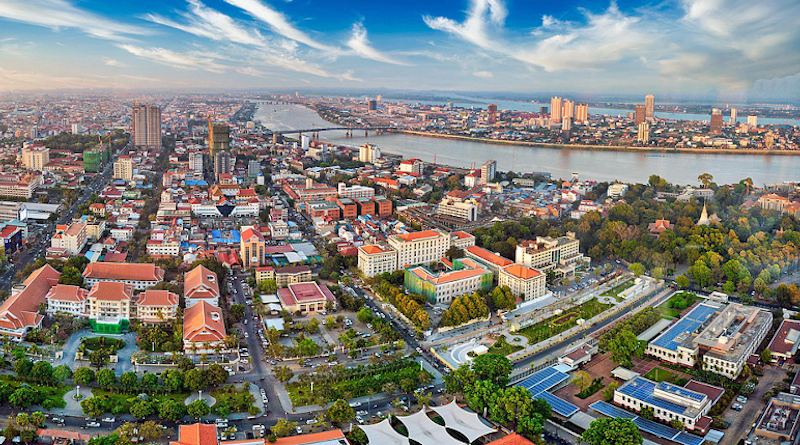Cambodia’s Approach To Promoting Regional And Global Cooperation And Peace – OpEd
By Yen Samnang
In today’s ever-changing world, political and socio-economic dynamics are constantly shifting. Currently, the world has witnessed the deteriorating situation in Myanmar, the ongoing Russian-Ukraine war, the escalating crisis in the Middle-East, the geopolitical tensions among the superpowers and other unconventional threats. These daunting issues have significantly affected global security, stability, cooperation, and development, creating a sense of unpredictability and uncertainty for all countries.
Given these global issues, Cambodia, as a post-conflict country, places immense significance on the peace and security. After completely gaining hard-earned peace in 1998, Cambodia has strived to impressively rise from the ashes. Consequently, it has rapidly grown in human development, economic growth and nurtured strong ties with countries in the region and beyond. Clearly, the kingdom’s journey from war-torn devastation to peace and stability has been a testament to its resilience and determination.
Cambodia, once abandoned by the world during the dark period of genocide, has expanded its collaboration with other countries from bilateral to multilateral frameworks through its active engagement in regional and international organizations including the Association of Southeast Asia Nations (ASEAN), Asia-Europe Meeting (ASEM), the United Nations (UN) and other international bodies and blocs. Definitely, these institutions have been instrumental in safeguarding Cambodia’s security, peace, and development and also serve as avenues for Cambodia’s integration into regional and global platforms.
Definitely, Phnom Penh considers ASEAN an essential security buffer, safeguarding its independence and sovereignty from invasion and interference. The Treaty of Amity and Cooperation (TAC) highlights the importance of respecting each other’s independence, sovereignty, equality, territorial integrity, and national identity. Being part of this regional block also enables Cambodia to diversify its array of strategic and economic partners, which in turn bolsters its ability to counteract security and economic challenges in the face of mounting geopolitical competition.
Cambodia, as a responsible member of ASEAN, plays an essential role in regional diplomacy and cooperation through its active participation in multilateral forums and initiatives to promote dialogue, mutual understanding, and peaceful resolution of the regional and international issues. Cambodia’s commitment to upholding the principles of the ASEAN Charter, including respect for territorial integrity and non-interference in the internal affairs of member states, has strengthened the ASEAN centrality and unity in the regional architecture.
Evidently, despite tough challenges, Cambodia managed to successfully host the 40th and 41st ASEAN Summits and Related Summits during its chairmanship 2022, demonstrating the crucial role of ASEAN centrality and ASEAN-led mechanisms in promoting regional peace, security, stability, and prosperity.
Most importantly, Cambodia is committed to upholding its independent and neutral foreign policy, embracing the principle of being “friend to all and enemy to none”. This commitment was reaffirmed by Cambodian newly appointed Prime Minister Hun Manetduring his speech at the 78th Session of the United Nations General Assembly in September 2023. Cambodia intends to maintain its existing approach of “independent and neutral foreign policy, grounded in the rule of law, equal mutual respect and adherence to the principles of the UN Charter” in order to advance its national interests, nurture current friendships, and cultivate more harmonious relationships.
As a country ravaged by war in the past, one of the main goals of Cambodia’s foreign policy is to promote international peace through the principles of equality and rights for all individuals. Hence, despite its limited resources, Cambodia has actively partaken in UN peacekeeping missions since 2006. Cambodia has dispatched peacekeepers to 12 missions in nine countries, totaling 9,205 personnel, which include 726 female peacekeeping officers. Obviously, Cambodian peacekeepers have served in various conflict zones around the world, providing humanitarian assistance, maintaining peace and order under the UN peacekeeping umbrella, remarkably contributing to the maintenance of international peace and security.
Additionally, the incumbent premier Hun Manet clearly reiterated that Cambodia strongly opposesany acts of aggression against sovereign states, interference in their domestic affairs, and the threat or use of force in international relations. Noticeably, in October 2022,Cambodia joined 142 other countries in voting for a resolution to endorse the principles of the UN Charter, denouncing the annexation of four Ukrainian regions by Moscow whereas its neighbors abstained.
Lately, in a letter responded to Ruslan Stefanchuk, Chairman of the Parliament of Ukraine, President of the Cambodian Senate, Hun Sen wrote that, “Cambodia remains committed to supporting efforts aimed at restoring peace in Ukraine, emphasizing that Cambodia attaches great importance to peace, stability, and the promotion of dialogue to resolve conflicts and differences”.
While serving office in 2023, former premier Hun Sen also expressed his apprehension and called on all parties to avoid deploying cluster munitions in the Russian-Ukraine war. The use of such weapons would lead to disastrous consequences for innocent civilians, even long after the war finishes. Cambodia’s own harrowing history of prolonged war has already proven the severity of these consequences. It has taken Cambodia decades to eradicate these hidden threats, but the mission is far from completed.
Absolutely, Cambodia, as a small state, has no weight to influence the parties involved in the Russia-Ukraine war to cease fighting or come to the negotiating table. Yet, some analysts believe that if there is no meaningful dialogue among the stakeholders, the war will persist even longer, continuously claim the lives of the innocent and cause the socio-economic devastation to the concerned countries.
Given the world’s rise in conflicts, it is imperative for all UN’s member states to adhere to international law, including the principles outlined in the UN charter, and reinforce the rules-based international order through enhancing bilateral and multilateral cooperation. Together, they will be able to advocate for a world where everyone can enjoy peace, security, stability, sustainable development, and prosperity.

